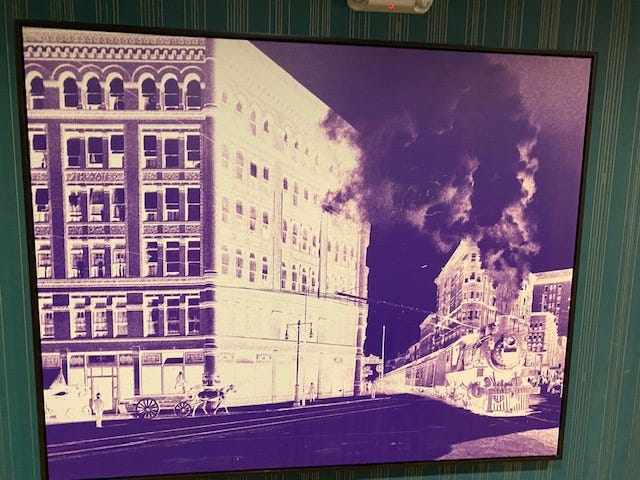Before we launch in, I wanted to let you know about a podcast I recorded with Hamish McKenzie (the co-founder of Substack) just before I left on tour. Hamish is a wonderfully generous person and interviewer, who describes the purpose of the podcast like this:
The internet has been conditioning our minds and influencing the global consciousness in ways that we are only beginning to understand – and writers are on the front lines. In The Active Voice, Substack co-founder Hamish McKenzie talks to great writers about how they are reckoning with the challenges of the social media moment, how they find the space for themselves to create great literature and journalism among the noise, and how to make a living amid the economic volatility of the 2020s.
I was Hamish’s first guest on the podcast, and will soon be followed by Jessica Reed Kraus, Samantha Irby, Glenn Loury, Cheryl Strayed, and Chris Hedges, with many more to follow.
I’m writing this on Monday morning, having finished my first long-weekend teaching session with our grad students. It was such deep, rich fun - an amazing group. I’m heading to New York City today, for three events there over the next three days.
As usual, your excellent Comments have rendered me redundant. But here are some “after-second-read thoughts,” from the Syracuse airport. So please forgive any errors and my slightly rushed tone…
(For reference/easy access here, again, is “Anyone Can Do It,”courtesy of Zyzzyva magazine, where the story originally appeared.)
I want to look at that moment in town. As discussed last time, this is where (I claim) Delfina changes her mind about pitching in with Lis. (She says, later, that she hasn’t thought about it, but I wonder…)
Let’s see how this scene plays out, i.e., let’s see what changes her mind. This is important because when, at the end, we see that she has made a mistake, our mind goes back over the story to locate the reason for this mistake. (Although, it also occurs to me that this move - deciding to go to the fields with Lis) is not actually the fatal error, as she could have gone there but not trusted Lis with the keys.)
But still - let’s see what’s going on in the store.
So, at the end of her conversation with Lis, we get this:
I’ll have to think about it, said Delfina.
Which we take to mean: “I am still saying no. I am not going to the fields with you. “
The next morning Delfina walks, with Kiki into town, to call her mother. During that call, there’s this bit, which seems fraught:
Did you hear that? she interrupted her mother, dropping another coin. I don’t have much time left.
Now I feel more keenly the connection between “limited money” and “limited time to act,” maybe.
At the mention of “Western Union” in the following, we realize that, yes, her mother is right: Delphina is calling for money:
She had not even given them the address for the Western Union office and she would have to apologize, she knew, when the worst of the financial troubles would be upon her.
She lets Kiki keep the dimes, indulges in the purchase of the ice cream, and then discovers that he has stolen the toy car.
This is a pretty interesting decision point for Delfina. As was pointed out in the Comments, the expectation here – from other stories and films and, maybe, for some of us, real life — is that we are about to see that archetypal moment when a parent makes their child return a shoplifted item. But that isn’t what happens here. She lets him keep the car and they return home.
So, we note this as a departure from our first-order expectation.
Here's the sequence again, stripped back to its essence:
Thinking about Lis, Delphina decides to walk, rather than drive, to town.
In town, she calls her mother to ask for money.
She gets upset and neglects to finalize/arrange the ask. (We might note that she hasn’t entirely burned that bridge…she knows she’s going to come back and ask again soon. She’s “deferred asking” until “the worst of the financial troubles” are upon her. And that will be, we might imagine, a more difficult call to make (now that she’s hung up on them).
She collects Kiki, drops the dimes. (There’s a slight feeling in here of building chaos and parental anxiety, a feeling that she’s afraid of losing control of Kiki.)
So, she promises ice cream to get him out of there.
She finds he’s stolen a little toy car.
So, I see this pulse of the story working is as a sort of one-two punch. The unpleasantness with the mother and sister causes her to botch/defer the ask. This raises the tension. The dimes – our awareness of her awareness of those dimes – underscores, maybe, how little money she has left. Her lack of control over Kiki and her anxiety re the shop owner possibly coming over serve to increase the pressure on her even more.
Now, to hone in on the question of what work the toy car is doing, we might try imagining a version of the story without the theft, in which, immediately following the ice cream, she goes home, and then agrees to go pick with Lis.
This actually works: her request for money fails, we’re subtly reminded that, for her, money is a ticking clock, and (“therefore”) she changes her mind.
What’s lost by this?
Let’s hold that up against the version with the toy car in it.
So, like this:
Bad phone call, dropped dimes, ice cream….changed mind.
vs:
Bad phone call, dropped dimes, ice cream, reveal of stolen car….changed mind.
It’s interesting - we don’t “see her” decide to let him keep the car. We just see the result (she takes him home). We don’t “see her decide” to go into the fields. We just see the result:
I’ve thought about it, Delfina said, though she really hadn’t. I think it’s a good idea.
Now, the fact that she hasn’t thought about it doesn’t necessarily mean that the stuff at the store didn’t contribute to or even cause the reversal. This is a lovely insight into how our minds actually work. We are feeling things and being influenced even when the mind is quiet or preoccupied.
What’s wonderful is that this sequence is going to fall on each of us differently. Because her thoughts aren’t narrated, we can each make of it what we will – there’s something cinematic about this. There’s a certain feeling that comes out of the juxtaposition of “Bad phone call, dropped dimes, ice cream, reveal of stolen car. “
There’s an implied causation and, to my mind, the story feels bigger for not explaining it.
I read it this way: she feels that their poverty, and the way she is stressing over money has somehow driven Kiki to steal the car – he knows better than to just ask for it. He’s becoming that sort of kid - sneaky, because of his understanding of their circumstances. And this vision of her child as someone being shaped/malformed by their poverty encourages her to take matters into her own hands – to be the head of the household, and make the decision to go into the fields.
As some of you have pointed out, it’s no accident that what’s stolen is a car. We might imagine a version of the story where Kiki steals something else – a toy soldier. Does it matter? Of course, if you know me at all, you know that I think it does. For what it’s worth, I never overtly made the connection (small stolen car plus real stolen car) until I read some of you discussing it in the Comments. It didn’t come to my mind later, either, when Delphina hands over the keys.
I also felt, at that moment (lulled by Lis’s energy and also by the shape of the story thus far) felt I was being prepared for a surprisingly hopeful ending – that Lis was going to surprise me, by turning out to be a good egg.
Well, we all know how that turned out.
But I think all of this is evidence of how closely tended the story is – I think Munoz was very aware of where he had put me. Part of the thrill was watching the way my mind worked with the evidence of the story...I was walking in Delfina’s footsteps and made the same error of judgment she did and I shared her surprise and, even, shame.
I just received some answers to your wonderful questions, from Manuel, and will be posting them on Sunday, for paid subscribers.
O.K., looks like we’re about to board. I’ll close with some photos from my lovely weekend in Syracuse…












As usual, George, your response to Munoz's story and to our responses to Munoz's story prompt more...responses! Well, actually, a few thoughts.
One of your responses struck me as deeply true about Munoz's technique: What you called the "cinematic" approach of showing Delfina's actions rather than narrating her internal thoughts, her inner conversation.
I think that the reason why so many of our responses to the story vary across a range of interpretations (just look at the more than 200 comments to the Sunday post!) is that Munoz encourages that with his cinematic storytelling--or maybe I would call it an action-centric storytelling, in which the character's actions and behavior tell us what we need to know, and grant a great deal of space for interpretation.
It can also be seen as a storytelling approach that's against interpretation; there is never an explanation for Delfina's actions (why, so many of us wondered, back and forth with each other, did she change her mind and go to the orchards with Lis?, or , why didn't Delfina make her son return what he shoplifted?), and Munoz deliberately denies himself the perfectly legitimate (and artistically sound and justified) option of providing us with his character's inner thought process. By not letting that into the storytelling, he strips something away, but opens up something else: A space for our own active interpretation of why a person is doing what they're doing.
I'd like to suggest something here, that ties this in with the Cinematic: As I read the story and all of our interesting and thought-provoking responses, I was thinking of the films of Michelangelo Antonioni, who is a master of many things, one of which is the art of the open interpretation.
There are scenes in almost every one of his movies in which characters do things in a scene or across a sequence that never go explained, that may feel impulsive, that we watch and then wonder about: "Now, why did she do that just now? Huh. I have to sit with that." It's precisely what you identified, George, as Munoz's wonderful insight into the way our minds work, how we're influenced/affected by things even when our minds are "quiet."
Another thing that was pretty wonderful in your response, George, that I'd like to point a light on.
Here's your quote, late into today's post, about reading Munoz's story:
"Part of the thrill was watching the way my mind worked with the evidence of the story...I was walking in Delfina’s footsteps and made the same error of judgment she did and I shared her surprise and, even, shame."
That phrase: "Watching my mind work..."
I think that little phrase may be the key to this whole Story Club Thing, and maybe also the key to A SWIM IN THE POND IN THE RAIN. It may really be the key to good creative writing, and definitely for discovery writing. You're actually helping train folks--that may sound too strict, or rigid, but it's really not--on how to watch the mind work while reading and writing. "What am I thinking at this moment?" "Oh, wait, I thought that thing on the previous page, and now, I have to contend with this new information over here, and what do I think about that?" "I had assumed that, but I thought wrong, and I got this" (There's the perfect example in the story where, George, you express surprise that Lis ended up behaving worse than you had expected or hoped for.)
The "annoying" (not really!) way of digesting a story in small pieces in Story Club, stopping, working over what this small piece was doing, and where things were going, all of this is a way of helping us watching our minds working through a story. And for me, all of this is a fantastic exercise in nudging me toward better creative/discovery fiction writing. It's something you discuss at length in your new interview on Barnes & Noble "Poured Over" about how you wrote and re-wrote the stories in LIBERATION DAY.
Some late-to-the-discussion thoughts on the story:
The more I read this story, the more I see it as a story of a marriage--a woman married to an unkind man, a woman who left her family behind because of this man. From the very beginning, she sees herself as different from the other women in the neighborhood, women who love their husbands and who are loved in return:
"When Delfina saw the first shadow rise in defeat, she thought of the private turmoil these other women felt in the absence of their men, and she knew that her own house held none of that."
She does not feel turmoil with her husband gone. She is worried, yes, about money (as the first sentence of the story attests). But: "Delfina was one of them, but her worry was a different sort." So her worry is more than a worry about money. It is worry about her husband and how she managed to get herself stuck in the situation she finds herself in, far away from her mother and sister who told her not to go.
"She was alert to her own worry, to be sure, but she felt a resolve that seemed absent in the women putting out last cigarettes and retreating behind the screen doors." Again, she is not like them. "The longer she held her place on her front steps, the stronger she felt."
So what is this resolve she feels? Why does she feel stronger the longer she sits on the steps?
I'm not certain.
And then there is this: "To have them come back would mean the lull of normalcy, of what had been and would continue to be, just when she was on the brink of doing something truly on her own." And so she is excited to defy this husband of hers, who doesn't like the idea of a wife working. There is more to this than money. There is Delfina feeling her own agency, becoming herself.
Much later, when the foreman who drives her treats her with kindness, there is this:
"she would hold private the detail of the ring on the foreman’s finger. She would hold in her mind what it felt like to be treated with a faithful kindness." So unlike her own husband! This man, who is married to someone else, is a kind man. Delfina wonders what it must be like to be married to someone like that, but she keeps such thoughts to herself.
I'm struck, also, by Delfina's reaction to the sudden knowledge that the car is stolen. She hardly reacts. She steels herself. It's as though she feels the box that she lives inside tightening around her. Here, she finally did something on her own. Until now, she has been hearing advice from her mother, her sister and her husband. But this--this is hers. And she has been defeated.
I see the ending as a defeat: "how a car had driven away slowly, slowly, and on out past the edge of his little hand and out of their lives forever." What now for Delfina? She is trapped, completely. I guess i'm hoping she'll leave her husband and go back to her mother and sister in Texas and begin again. As tough as they've been with her, they love her and send her money when she needs it.
I never made it all the way through all the comments on this story in the last post, so apologies if what I've raised here has been raised before.
Okay, time to listen to the podcast!
I hope you're having a blast George and that it's not too terribly exhausting....